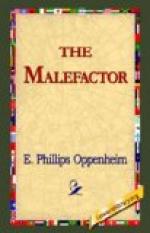“My answer to both questions is ‘No!’” Aynesworth said a little stiffly. “I only entered the service of Sir Wingrave Seton this morning, and I know nothing at all, as yet, of his private affairs. And, Lady Ruth, you must forgive my reminding you that, in any case, I could not discuss such matters with you,” he added.
She looked at him with a faint, strange smile. Afterwards, when he tried to do so, Aynesworth found it impossible to describe the expression which flitted across her face. He only knew that it left him with the impression of having received a challenge.
“Incorruptible!” she murmured. “Sir Wingrave Seton is indeed a fortunate man.”
There was a lingering sweetness in her tone which still had a note of mockery in it. Her silence left Aynesworth conscious of a vague sense of uneasiness. He felt that her eyes were raised to his, and for some reason, which he could not translate even into a definite thought, he wished to avoid them. The silence was prolonged. For long afterwards he remembered those few minutes. There was a sort of volcanic intensity in the atmosphere. He was acutely conscious of small extraneous things, of the perfume of a great bowl of hyacinths, the ticking of a tiny French clock, the restless drumming of her finger tips upon the arm of her chair. All the time he seemed actually to feel her eyes, commanding, impelling, beseeching him to turn round. He did so at last, and looked her full in the face.
“Lady Ruth,” he said, “will you favor me with an answer to my message?”
“Certainly,” she answered, smiling quite naturally. “I will come and see Sir Wingrave Seton at four o’clock tomorrow afternoon. You can tell him that I think it rather an extraordinary request, but under the circumstances I will do as he suggests. He is staying at the Clarence, I presume, under his own name? I shall have no difficulty in finding him?”
“He is staying there under his own name,” Aynesworth answered, “and I will see that you have no difficulty.”
“So kind of you,” she murmured, holding out her hand. And again there was something mysterious in her eyes as she raised them to him, as though there existed between them already some understanding which mocked the conventionality of her words. Aynesworth left the house, and lit a cigarette upon the pavement outside with a little sigh of relief. He felt somehow humiliated. Did she fancy, he wondered, that he was a callow boy to dance to any tune of her piping—that he had never before seen a beautiful woman who wanted her own way?
THE GOSPEL OF HATE
“And what,” Wingrave asked his secretary as they sat at dinner that night, “did you think of Lady Ruth?”
“In plain words, I should not like to tell you,” Aynesworth answered. “I only hope that you will not send me to see her again.”
“Why not?”
“Lady Ruth,” Aynesworth answered deliberately, “is a very beautiful woman, with all the most dangerous gifts of Eve when she wanted her own way. She did me the scanty honor of appraising me as an easy victim, and she asked questions.”




